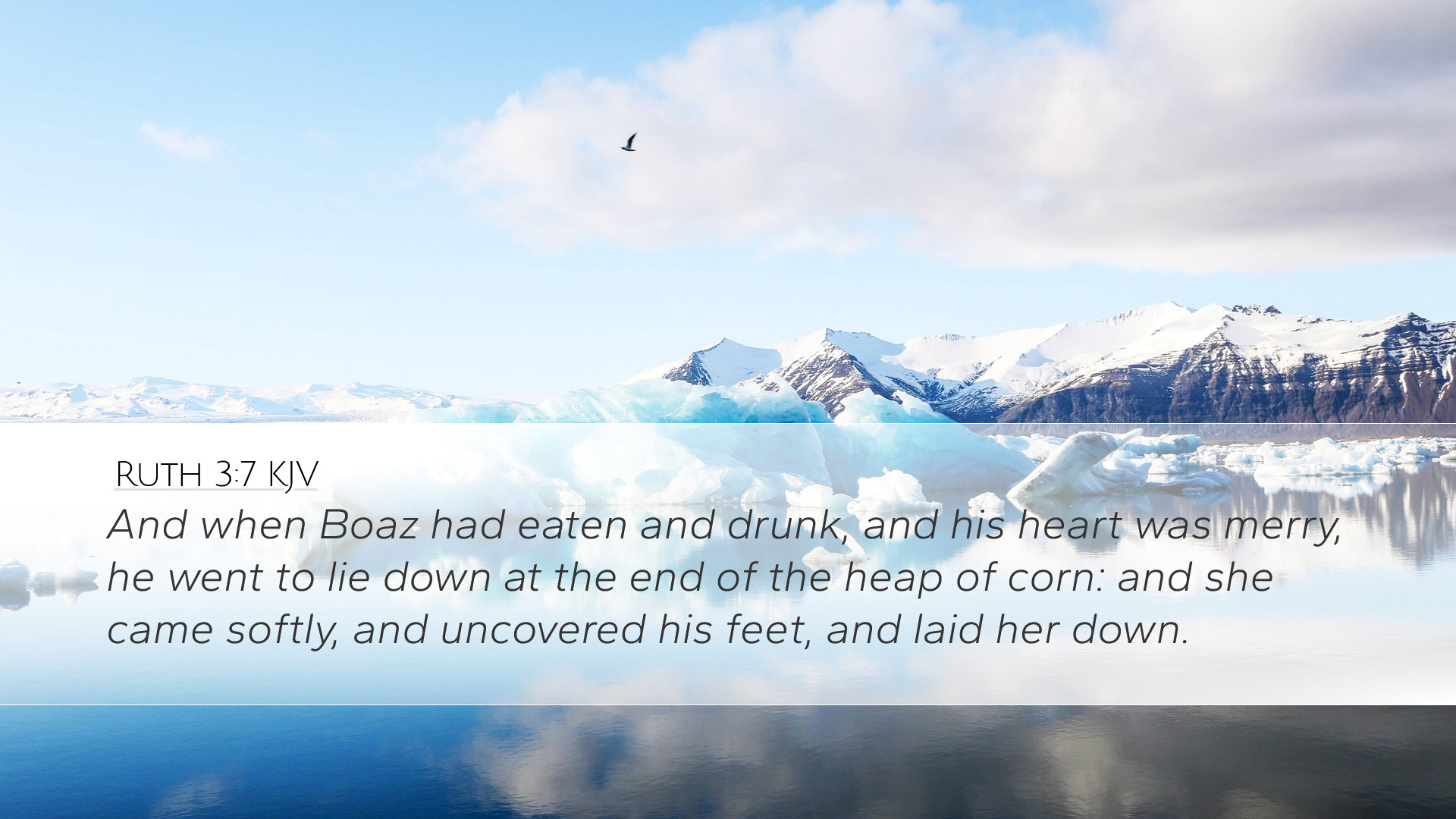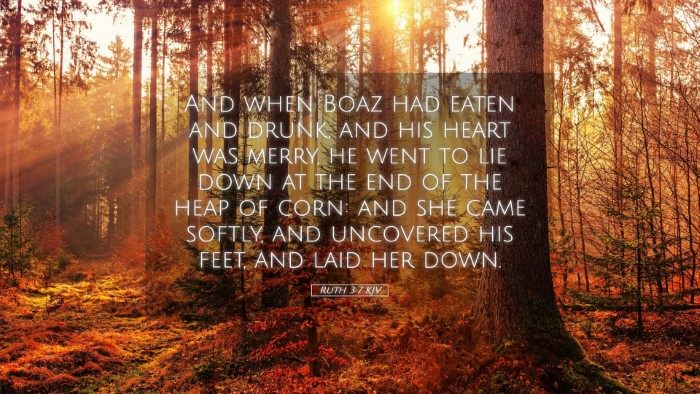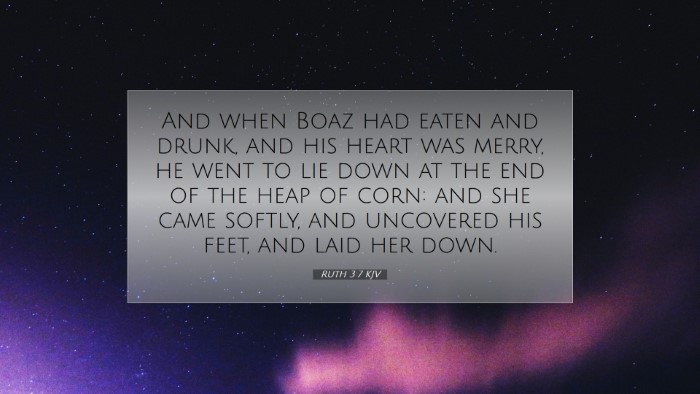Old Testament
Genesis Exodus Leviticus Numbers Deuteronomy Joshua Judges Ruth 1 Samuel 2 Samuel 1 Kings 2 Kings 1 Chronicles 2 Chronicles Ezra Nehemiah Esther Job Psalms Proverbs Ecclesiastes Song of Solomon Isaiah Jeremiah Lamentations Ezekiel Daniel Hosea Joel Amos Obadiah Jonah Micah Nahum Habakkuk Zephaniah Haggai Zechariah MalachiRuth 3:7
Ruth 3:7 KJV
And when Boaz had eaten and drunk, and his heart was merry, he went to lie down at the end of the heap of corn: and she came softly, and uncovered his feet, and laid her down.
Ruth 3:7 Bible Commentary
Commentary on Ruth 3:7
Verse: "And when Boaz had eaten and drunk, and his heart was merry, he went to lie down at the end of the heap of corn: and she came softly, and uncovered his feet, and laid her down." (Ruth 3:7)
Contextual Understanding
The book of Ruth presents a narrative rich in themes of loyalty, redemption, and divine providence. In the previous chapters, we see Ruth, a Moabite widow, who, despite the challenges of her background and circumstances, exhibits unwavering loyalty to her mother-in-law, Naomi. In this particular verse, we explore a critical moment that outlines the cultural practices surrounding redemption within the community of Israel.
The act described in Ruth 3:7 occurs during the barley harvest, a time of labor culmination, celebration, and social gathering. Boaz, as a kinsman redeemer, plays a vital role in the restoration of Naomi's family line and the overarching theme of God's provision through human actions.
Insights from Matthew Henry
Matthew Henry in his Commentary on the Whole Bible highlights the importance of Boaz's merriment before his encounter with Ruth. Boaz's celebratory state can be seen as an emblem of a joyful heart, indicative not only of his physical circumstances but also of a spiritual readiness to receive a significant relational development. Henry notes that prayerfully approaching one's Redeemer requires a heart prepared to act in faith.
Additionally, Henry comments on Ruth's boldness and prudence. Her approach to Boaz reveals her understanding of the cultural norms and her willingness to embrace them to secure a future for herself and Naomi. Uncovering his feet is an act laden with both humility and expectation, emphasizing her reliance on Boaz's character as much as on the customs of redemption.
Insights from Albert Barnes
Albert Barnes offers a thorough exploration of the cultural implications surrounding this verse in his Notes on the Old Testament. He explains that lying down at the feet of a kinsman redeemer symbolizes submission and a request for protection and future provision. For Ruth, this act is profoundly significant as it aligns with the social norms of her time while aligning her with Boaz's benevolence.
- Intimacy and Vulnerability: Barnes notes that Ruth's actions place her in a vulnerable position, yet she exhibits great faith in God's providence through Boaz’s character. This moment illustrates the delicate balance of human agency and divine orchestration.
- Spirit of Cooperation: The mutual recognition of roles in Boaz and Ruth's relationship signifies a deeper spiritual cooperation in acts of faith and redemption.
Insights from Adam Clarke
Adam Clarke, in his Commentary on the Bible, provides a detailed analysis of the verse, emphasizing the narrative's dramatic tension. Clarke suggests that Boaz’s sleep represents a moment of divine pause where significant transitions occur quietly yet powerfully. This juxtaposition of repose and impending action underscores a key biblical principle: victory and redemption often arise from humble circumstances.
Clarke also takes note of the idea that Ruth’s act of uncovering Boaz's feet can be regarded as an appeal for his attention and readiness to fulfill his role as the kinsman redeemer. Clarke draws parallels from other biblical passages to illustrate the significance of feet uncovering in the context of seeking shelter and protection under one’s wings, thereby connecting Ruth's actions with the broader themes of divine shelter and providence.
Theological Implications
The act of uncovering Boaz's feet serves as a powerful metaphor within the theological framework of redemption. It exemplifies the themes of humility, hope, and proactive faith. Ruth's actions reflect not merely a cultural custom but resonate with a theologically rich understanding of how God orchestrates redemption through human actions, albeit in sometimes unconventional manners.
Pastors and theologians can draw from this passage the importance of taking bold, albeit humble, steps towards seeking God’s provision in their lives and ministries. The narrative invites reflection on how faith can inspire action that stands in alignment with divine purpose, despite societal challenges or risks.
Application for Ministry
For pastors and ministry leaders, the insights from Ruth 3:7 challenge the ethos of how we approach major decisions—be it concerning the church community, missions, or personal ministry. It encourages an openness to the roles God places in our lives, emphasizing the importance of community, humility, and faith in seeking God’s will.
- Emphasizing Humility: Like Ruth, ministry leaders must come before God with humility, recognizing their dependency on His grace.
- Trusting Divine Timing: The narrative invites leaders to trust in God’s timing and provision, understanding that sometimes the biggest breakthroughs come in moments of quiet faith.
Conclusion
Ruth 3:7 encapsulates the profound intersection of human actions with divine providence. Through the insights of notable commentators, it becomes clear that this moment is laden with cultural significance while serving as a narrative device that foreshadows greater redemptive purposes.
As individuals dedicated to God’s Word and service, reflection on this passage can cultivate a deeper understanding of the ways in which God calls us to engage boldly yet humbly with His plans, ultimately leading us toward a fuller experience of His redemptive work in our lives and in the lives of others.


